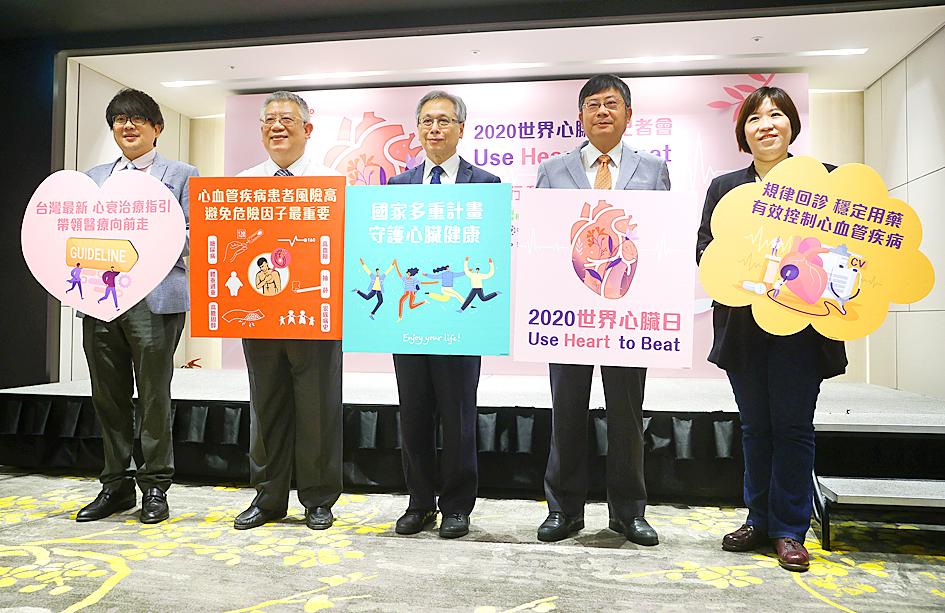The Taiwan Heart Foundation and the Health Promotion Administration (HPA) yesterday urged people with chronic cardiovascular conditions to make regular outpatient visits to avoid the risk of sudden cardiac arrest.
Heart disease was the second leading cause of death in Taiwan last year, killing one person every 26 minutes, Ministry of Health and Welfare data showed.
Cerebrovascular stroke, hypertension, diabetes, kidney diseases and vascular disease also cause more than 53,000 deaths each year, the HPA said.

Photo: CNA
Foundation executive director Hwang Juey-jen (黃瑞仁) said that heart disease is often linked to the “three highs” — high blood pressure, high blood lipids and high blood sugar — and people with these chronic conditions and who are taking medication should make regular outpatient visits and should not stop taking their medication on their own.
The risk of heart attack in people with high blood pressure, high blood sugar and high blood lipids are 1.78 times, 1.47 times and 1.43 times of healthy people respectively, the HPA said, citing a 2018 study.
Hwang said that due to the COVID-19 pandemic, many people with chronic cardiovascular conditions have stopped making their regular outpatient visits in the past few months, especially between March and May, and although the number of visits increased in June, it was still about 10 percent less than before.
Without regular follow-up on their conditions or medication, the patients might be at risk of an increased risk of sudden cardiac arrest, he said, adding that the five-year mortality rate in patients with heart failure is about 50 percent.
Studies conducted China, Italy and the US also suggest that COVID-19 patients with the “three highs” or cardiovascular conditions have a higher risk of death, the HPA said.
HPA Director-General Wang Ying-wei (王英偉) said that about 80 percent of premature death from heart disease and stroke can be prevented by practicing healthy habits, such as exercising regularly; avoiding sugary beverages, deep-fried food, smoking and second-hand smoke; and drinking enough water throughout the day to stay hydrated.
People with chronic cardiovascular conditions should also undergo follow-up exams, control their blood pressure, blood sugar and blood lipids based on their doctor’s prescription, and avoid changing the dosage or stop taking the medicine on their own, Wang said.

The Ministry of Foreign Affairs (MOFA) yesterday voiced dissatisfaction with the Comprehensive and Progressive Agreement for Trans- Pacific Partnership (CPTPP), whose latest meeting, concluded earlier the same day, appeared not to address the country’s application. In a statement, MOFA said the CPTPP commission had "once again failed to fairly process Taiwan’s application," attributing the inaction to the bloc’s "succumbing to political pressure," without elaborating. Taiwan submitted its CPTPP application under the name "Separate Customs Territory of Taiwan, Penghu, Kinmen and Matsu" on Sept. 22, 2021 -- less than a week after China

THE GOOD WORD: More than 100 colleges on both sides of the Pacific will work together to bring students to Taiwan so they can learn Mandarin where it is spoken A total of 102 universities from Taiwan and the US are collaborating in a push to promote Taiwan as the first-choice place to learn Mandarin, with seven Mandarin learning centers stood up in the US to train and support teachers, the Foundation for International Cooperation in Higher Education of Taiwan (FICHET) said. At the annual convention of the American Council on the Teaching of Foreign Languages held over the weekend in New Orleans, Louisiana, a Taiwan Pavilion was jointly run by 17 representative teams from the FICHET, the Overseas Community Affairs Council, the Steering Committee for the Test of Proficiency-Huayu, the

A home-style restaurant opened by a Taiwanese woman in Quezon City in Metro Manila has been featured in the first-ever Michelin Guide honoring exceptional restaurants in the Philippines. The restaurant, Fong Wei Wu (豐味屋), was one of 74 eateries to receive a “Michelin Selected” honor in the guide, while one restaurant received two Michelin stars, eight received one star and 25 were awarded a “Bib Gourmand.” The guide, which was limited to restaurants in Metro Manila and Cebu, was published on Oct. 30. In an interview, Feng Wei Wu’s owner and chef, Linda, said that as a restaurateur in her 60s, receiving an

MORE RETALIATION: China would adopt a long-term pressure strategy to prevent other countries or future prime ministers following in Sanae Takaichi’s steps, an academic said Taiwan should maintain communications with Japan, as Japanese Prime Minister Sanae Takaichi is to lead a revision of security documents, Taiwanese academics said yesterday. Tensions have risen between Japan and China over remarks by Takaichi earlier this month that the use of force against Taiwan would constitute a “survival-threatening situation” for Japan. Prospect Foundation president Lai I-chung (賴怡忠) yesterday said Takaichi’s stance regarding Taiwan is the same as past Japanese prime ministers, but her position is clearer than that of her predecessors Fumio Kishida and Shigeru Ishiba. Although Japan views a “Taiwan contingency” as a “survival-threatening situation,” which would allow its military to